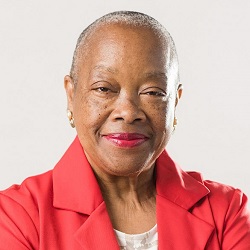Commentary on Genesis 1:1-5
Whenever I teach Hebrew language, I always give students Genesis 1:1-6 to read before they know much more than the alef bet and how to form sounds in the language.
I choose this passage because I’m assured that it is one part of the biblical text students have heard or read. And the Hebrew is fairly simple and rhythmic. It almost sings. And it certainly dances. This year, while teaching it, students came to the words usually translated “the spirit moved across the face of the deep” or “the wind swept across the face of the waters.” The word translated “moved” or “swept” is merahepet, a piel feminine participle, which could just as well be translated “fluttered” or “shimmied.” Students decided that the spirit of God (another way to translate ruach), danced over the face of the deep. Creation was a joyful party full of cosmic sound and motion of what could be. I liked that. It became our theme for the semester. It reminded me of James Weldon Johnson’s stylistic poem, “The Creation.”
And God stepped out on space,
And he looked around and said:
I’m lonely—
I’ll make me a world.1
Genesis 1 is a dance between divine desire and creative possibilities. God does not create from nothing, but rather from an untamed something that is formless and void (tohu va-vohu, in Hebrew). Together, this state of the “stuff” with which God has to work, is threatening. But God knows that to do with it. Creation is intentional and relational. The words rhyme as the poet who writes these words intends. It is poetry in motion, metaphorically and literally hovering, fluttering, shimmying in the presence of God/s (The Hebrew word “Elohim” is translated singularly as God, but it also means gods and somethings heavenly being (Psalm 8:5, often, and probably correctly, translated “a little lower than angels or gods, rather than the proper name, “God”). Wild and foaming chaos, but God is there, with Wisdom in tow to make it into what it could be (Proverbs 8).
For Johnson, God does more than speak, and the way the world bustles into being, one can see agree with him:
Then God smiled,
And the light broke,
And the darkness rolled up on one side,
And the light stood shining on the other,
And God said: That’s good!
The waters roar and need to be ordered, but it does not need to be tamed. Rather than needing to destroy a sea monster, God created Leviathan so that the great creature can play in the waters (Psalm 104:26). But there is chaos and uncharted waters; there is the depths of the sea that requires land for inhabitants of the creation more than what can swim.
God creates in beginnings. The first word in the text is awkward. It’s not “In the beginning,” but rather “in beginning” or “at the first,” a bit of “once upon a time, when the world did not exist.” It’s the beginning of the story of God for a particular people. Myth is not a bad word, though it gets a bad rap. Myth is meaning-making and the first poets wrote these stories under the inspiration of Spirit to describe this glorious beginning. In the midst of other peoples and other deities, they want to know something of their own God.
The journey of creation becomes the journey of a people. Genesis does not intend to be a science lesson, not even a history lesson, but rather a theological treatise. “This is how much God loves and wants the world,” is what the words suggest. God delighted. Readers won’t get to read those words until verse 10, but they are lurking in the evening and morning of every new appearance: Light, which complements darkness. God did not dismiss the luminous darkness, because God dwells in the thick darkness as well as the light (Exodus 20:20-22; 2 Chronicles 6:1), and night and day are the same to God. So, light balances for us the way we experience God. We prefer the light, and God accommodates us. But whether light or dark, God is among us.
It will fall to humans to live in wonder, or risk creation suffering from human hubris. That, too, is in the very first part of this text. Humans are not first, and though theologians like to think that humans are the crowning achievement of creation, there is nothing in the texts to suggest such. People read “very good” in verse 31 as referring on to humans, and yet the text says that God surveyed “everything [God] had made” and declared it very good. From the darkness to the end of every epoch, it is good. Humans are “made in God’s image” (Genesis 1:26-27), but all creation is glorious.
This text comes on the Baptism of our Lord Sunday, in Epiphany. It reminds us that creation began in the watery chaos, and so does our journey in our faith. We are baptized into chaos that God orders our lives with the dance of the Spirit. Sometimes that ordering happens in darkness, but God smiles and darkness rolls aside. We often can’t experience the “order” of what God is doing, but mud-people that we are, we are loved.
Notes
1 https://www.poets.org/poetsorg/poem/creation/


January 7, 2018